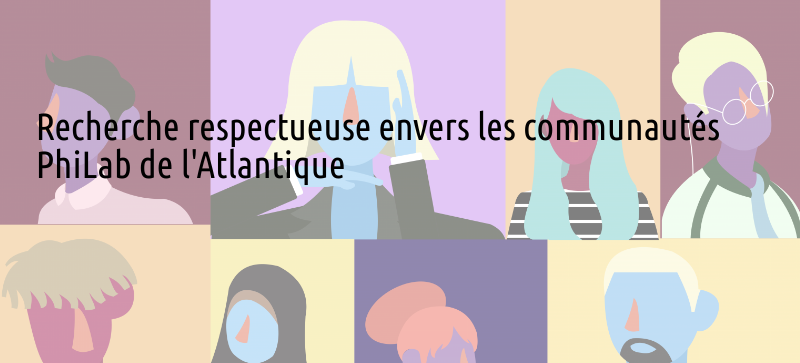
By Kelly Vodden, PhiLab Atlantic Hub Director, Sondra Eger, PhiLab Atlantic Hub Coordinator, and Emily Doyle, Grenfell Campus Research Assistant
This issue of the PhiLab Atlantic hub newsletter entitled, “Respectful community engaged research” considers how philanthropy is complimented by an engaged approach to research to guide responsive philanthropy in the Atlantic context. In a recent video posting from the PhiLab Ontario Regional Conference (http://ow.ly/hQdm50FxLcD), Jean Marc Mangin (President and CEO of Philanthropic Foundations of Canada) begins by discussing the current big picture for the philanthropy sector in Canada, which he describes to be at a moment of opportunity for the sector to develop new social contact with Canadians. The transformational moment he describes is due to the co-occurring political, economic and social shifts that have risen out of the pandemic. He speaks of the critical role that research plays at this moment in helping to shed light on how these transformations are relevant to practice and policy. In this issue, we highlight our recent regional conference and its engagement with communities and provide multiple perspectives on how community-based research (CBR) is being applied in the Atlantic hub.
Atlantic Hub 2021 Regional Conference
On June 7th and 8th, 2021, PhiLab Atlantic Hub hosted a regional conference titled Mapping the Landscape: Philanthropy and Community Investment in Atlantic Canada. Co-hosted with the Rural Communities Foundation of Nova Scotia and sponsored by Charity Village, the conference brought leaders, researchers, and students in the philanthropic sector in Atlantic Canada together with guest speakers from across the country.
Day one theme was Philanthropy, Community, and Environmental Resilience and welcomed Devika Shah (Environment Funders Canada) and Dana Decent (Community Foundations of Canada) to provide insights from their recently hosted national summit on philanthropy and the environment. Researchers and students then participated in a discussion to share their experiences and ask questions to our plenary guests.
Day two, Evidence-based Approaches to Maximizing Impact of Philanthropy, started with a plenary from Cindy Lindsay (Community Foundations of Canada) who shared insights on their recent national summit with community foundations across the country and community-based approaches to philanthropic study and practice including Susan Hirshberg from Rural Community Foundation of Nova Scotia, Harry Daley from Greater St. John Community Foundation, and Daniel Holland from the Community Foundation of Nova Scotia.
The conference was very well received with several research questions and key themes identified that matched the priorities of community-based organizations and partners that were present. The full report will be available soon with a break-down of all the themes that were brought forward and priorities that were set for the region. Working closely with community partners to identify research needs and co-develop and implement projects is a priority for our hub and the conference helped us do that as we plan for our activities in the years ahead.
What is Community Engaged/ Based Research?
CBR is participatory and inclusive of the people most directly affected by the issue of setting (Halseth, Markey, Manson, & Ryser, 2016). Community research can be thought of on a continuum, with projects placed on that continuum according to the degree to which the community is a participant and receiver of versus initiating and driving the research. The articles contained in this newsletter help to paint a multi-perspective picture of the principles guiding CBR. Described by Halseth et al. (2016), principles guiding CBR include understanding and accommodating for variability in community circumstances, conditions and capacities to respond to change. In this way CBR allows for a sensitivity to context that is a necessary ingredient to the perfect storm of transformation being felt across both the philanthropic sector and across communities in Canada.
How does the Atlantic hub embody/use/engage with respectful Community Based Research?
Two examples of recently funded research projects through the PhiLab Atlantic Hub provide insight into what we mean by respectful community engaged research. In recent research update (https://philab.wpdev0.koumbit.net/blogue-accueil/philab-atlantic-hub-bbchhc-community-place/) Masters student Samantha Young describes her role collecting information sought out by the community of Port aux Choix as they searched for a social enterprise model that fit the specific needs of their community. Later in this newsletter, Joan Cranston provides insight into the value of this research process to the Great Northern Peninsula from her perspective as a community member. A second example of research coming from the Atlantic hub is the recent work of Miranda Ivany, whose Masters thesis entitled “Rural Philanthropy: Mapping Patterns of Charitable Giving in Newfoundland and Labrador & Canada’s Atlantic Region”, demonstrates how CBR can be used as a tool to lead to strategic transformation through reflexive understanding of the philanthropic sector (see https://atrium.lib.uoguelph.ca/xmlui/handle/10214/25933 ). These two projects are just the tip of the iceberg as incoming students to the Atlantic Hub continue to delve into the sometimes murky waters of engaging in CBR as both method and personal process.
Multiple Perspectives of Community Based Research Brought Forward in this Special Issue
The multiple perspectives included in this newsletter include insights from an undergraduate student who reflects on the experience of trying to position yourself as both researcher and community builder. In her article, Sarah Lavallee reflects on her research, which was conducted in Wolfville, N.S and is about understanding the importance of human connection to greenspaces. Sarah will will be joining PhiLab Atlantic Hub as an intern in early 2022.
The next article by Edmund Yirenkyi, an incoming Masters student at Grenfell Campus, Memorial University, describes the new post COVID landscape for CBR. Yirenkyi observes the way in which COVID puts pressure on both philanthropic organizations and communities. Echoing the thoughts of Mangin as described above, Yirenkyi sees this as a moment of opportunity to rethink and rebuild a reflexive process where philanthropic organizations and community engaged researchers collaborate to respond to the needs of those most directly affected by the issues of concern.
In Sondra Eger’s article she shares a reflection on a Summer Intensive course on Community Engaged Scholarship and provides insight on why such training isn’t just important for respectful research but also for enhancing self-awareness for all individuals, no matter what their profession.
Finally, we are happy to share the insights from Joan Cranston, a community leader from Newfoundland and Labrador who speaks to what it is like to be on the community side of CBR. Joan poses her own questions and speaks to how even communities that are very close geographically can have very unique concerns and needs. These differences in local capacity and divergent assets and challenges are essential variables in the process of understanding the importance of and best ways to practice CBR, as well as how to support change post COVID.
The main message to be gained from insights we have brought together in this newsletter is the power of CBR to help us gain a better understanding of the transformation that we are currently facing by engaging with multiple perspectives and with communities. We close the issue with a hearty welcome to Dr. Laurie Brinklow from the Institute of Island Studies at the University of Prince Edward Island to the Atlantic Hub team.
Cet article fait partie de l’édition spéciale de Septembre 2021: Recherche respectueuse et engagée envers les communautés. Vous pouvez trouver plus d’informations ici
Halseth, G., Markey, S. P., Manson, D., & Ryser, L. (2016). Doing community-based research: perspectives from the field. Montreal [Quebec]: McGill-Queen’s University Press.



Commentaires